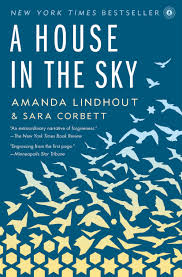I like titles. And one fun exercise I’ve dallied with as a reader is guessing where it originates, or hitting that moment in the book where it appears word for word. I can’t remember a better experience of that when, late on Saturday night, I came to that place in A House in the Sky, by Amanda Lindhout and Sara Corbett.
Let me first say that this is one of the best books I’ve ever read, because the story is one of the most painful I’ve ever read. It chronicles much of the life of the first author, Amanda Lindhout, up to and through the 460 plus days she spends imprisoned in Somalia. We know her so well by the time she ends up in the wrong car, going the wrong way. She feels like me, like you, like anyone.
When I first began reading this narrative, a Christmas gift from my sister-in-law, I had no idea what the title could mean and, in fact, it might have turned me off at first because it seemed so idealistic, so romantic. I thought maybe she might mean a lover found on the road, or what she hoped for after a childhood that left a lot to be desired, or what traveling the world meant to her. But when I finally approached the inspiration for the title more than halfway through, I felt relieved I hadn’t guessed it and that I had forgotten all about it by the time it stood in black print before me. For it is truly one of the best titles for what is a truly poignant story. It was how she escaped what was happening her, and it was how she survived.
In my mind, I built stairways. At the end of the stairways, I imagined rooms. These were high, airy places with big windows and a cool breeze moving through. I imagined one room opening brightly onto another room until I’d built a house, a place with hallways and more staircases. I built many houses, one after another, and those gave rise to a city–a calm, sparkling city near the ocean, a place like Vancouver. I put myself there, and that’s where I lived, in the wide-open sky of my mind. I made friends and read books and went running on a footpath in a jewel-green park along the harbor. I ate pancakes drizzled in syrup and took baths and watched sunlight pour through trees. This wasn’t longing, and it wasn’t insanity. It was relief. It got me through.
Though I never experienced anything close to what Amanda did, I was reminded of my childhood and the times that it was hard, the times that I felt I got no pleasure in the day to day, the times I was so jealous of my friends and their lives that looked so picture perfect to me. A house in the sky might have been good for me, to have some place to go rather than retreat inward as I so often did. But, as Victor Frankl proved in Man’s Search for Meaning, we all do what we have to do to survive. For me that meant telling myself, “Everything ends. The good ends, and so will the bad.” It never occurred to me to look back on the good, to sink into it as Amanda did.
Day by day, I collected up old sweetnesses and fed on them. I remembered the happier moments in my life, unfolding them with languorous slowness, time being the one currency I had to spend. I revised my early love for Jamie, with his mop of hair and his thrift-store outfits and his guitar.
Where do you want to go? he’d asked one afternoon in a park by the river in Calgary, back before we’d been to a single place or seen a single thing.
Anywhere, I’d said. Anywhere is good.
It had been the right answer.
In exacting detail, I could recall the rub of a heavy backpack on my shoulders, the petrol blur of Pakistani jingle trucks, the train stations and lamb kebabs, the flame-colored tent I’d slept in on the riverbank in Khartoum. I took myself back through the week I’d spent trekking to Everest base camp in Nepal one year with Kelly, the first nights I’d slept in Amanuddin’s house in Kabul. I recalled what it was like to scoop handfuls of sugared pistachios into my mouth in Calcutta and to dip triangles of soft pita bread into a bowl of creamy hummus served with mint sprigs in Beirut. I remembered the boy–that quiet, carefully dressed British stranger named Dan Hanmer–who’d sat by the green-black lake in Guatemala so many years ago, holding Kelly’s hand. I remembered diving into swimming pools, cold bottles of orange Fanta at the end of long bus trips, the fresh start of every conversation launched in the breakfast room of a two-star hostel, out there in the world.
I conjured my father’s laugh and my mother’s cooking, the stars in the sky over Sylvan Lake. I made peace with anyone who might ever have been an enemy. I asked forgiveness for every vain or selfish thing I’d done in my life. Inside the house in the sky, all the people I loved sat down for a big holiday meal. I was safe and protected. It was where the voices that normally tore through my head expressing fear and wishing for death went silent, until there was only one left speaking. It was a calmer, stronger voice, one that to me felt divine.
We can learn from any book, any time–any author. It’s one of the reasons I love memoir so much and why I like writing it: it teaches us, often to be grateful for what we have, and we gain perspective by seeing through another’s eyes for a few weeks. It has been a hard book to let go, one that will not leave me soon. We can all build a house in the sky, we can all find memories worth holding on to. You never know when you’ll really need them.

